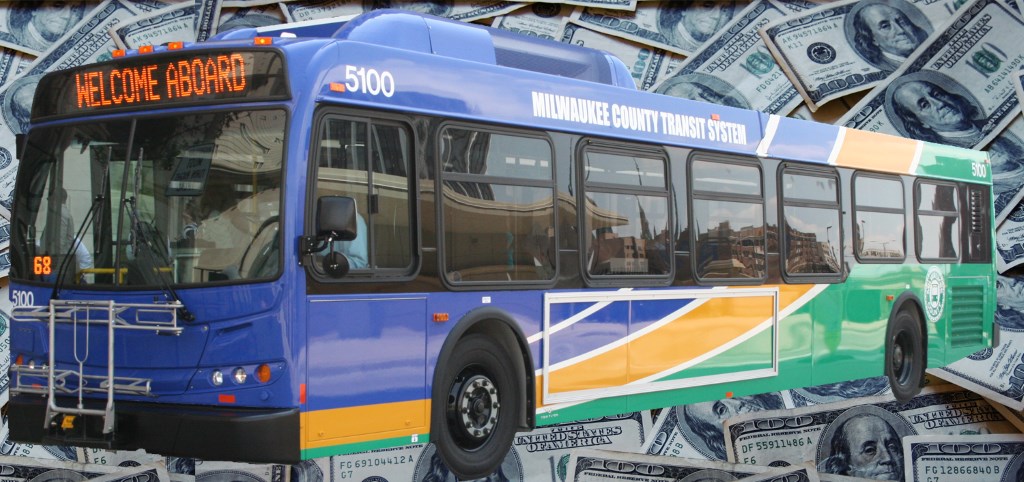Seattle Offers Lesson for Milwaukee
Rather than simply launching free transit, King County creates more sustainable model.
Transit is an incredibly affordable way to get around, but for people struggling to make ends meet, fares are still difficult to pay for.
If local governments decide to provide discounted or free fares to people in need, however, they need to budget for that expense. Otherwise they risk cuts to transit service — and harming the people who count on it — or providing temporary fare relief that won’t last very long.
Milwaukee’s underfunded transit agency is facing this very problem. Milwaukee County voted last year to make fares free for seniors and disabled people. But the county underestimated ridership and didn’t budget adequate funds, and now the discount fare program is running a $3.3 million deficit and in danger of elimination.
One city that’s building what looks to be a more sustainable model is Seattle. Katie Wilson at Seattle Transit Blog reports that King County officials are expanding the discount fare program to meet overwhelming demand:
Back in 1991, SHARE (Seattle Housing and Resource Effort) was spending most of their budget buying bus tickets so people could travel from their South Lake Union shelter to an overflow church on Capitol Hill. Nearly broke, they began meeting at the King County Administration Building before making the trek on foot. After weeks of this public demonstration of need the Metro Council relented: SHARE and other service providers could purchase tickets at a discount. The program has expanded steadily for twenty-five years, and last year 138 service providers distributed over 1.4 million tickets to homeless people, seniors, youth, students, veterans, refugees, and victims of domestic violence.
With housing costs and homelessness rising, the need for tickets has skyrocketed. The Transit Riders Union (TRU) learned from our members that tickets are a scarce resource; just procuring a few to get to appointments, meals, and shelter, let alone social activities, is time-consuming and stressful. Service providers confirmed this story. Queen Anne, West Seattle, and North Helplines can give people only a ticket or two per month. Often Compass Housing can’t get people to job and housing interviews. Casa Latina can help their day workers with transportation for only twenty days of each month. The King County Code caps the quantity of tickets available, and many organizations were not allocated nearly what they requested. For others, cost was prohibitive: providers pay 20% of face value, so the price per ticket doubled since 2008 due to fare increases.
The simple answer? Make more tickets available and cut the price. This summer TRU launched a campaign to do just that. We delivered hundreds of petitions and letters. Transit riders and service providers met with county officials and testified at public hearings.
This fall the King County Council and Executive responded. The council voted unanimously to raise the cap and then to halve the ticket price. Moreover, the Executive has promised to “direct Metro to engage other transit agencies, the state, other local jurisdictions, human services agencies and other potential partners in a discussion of transit’s role in contributing to the social safety net for the lowest income residents, and how to provide assistance while still being able to meet the growing demand for transit service throughout King County and the region.”
What to do in Milwaukee?
A number of changes are coming to the GO Pass program in Milwaukee as a result of the Milwaukee County budget. County Executive Chris Abele had originally proposed riders pay 25 cents per ride in 2017, a move that came as part of his push for an annual $60 vehicle registration fee. The county board, ever at odds with the executive, revised the proposal to be a $30 annual vehicle registration fee as well as a $1 per day fee for GO Pass users starting at an undetermined point in 2017. The county executive did include an income requirement, and the board approved a panel to study that. The approved budget includes the provision to form a committee of transportation officials as well as advocates for elderly and disabled riders to create a plan for income and other eligibility restrictions. With a new funding source and revised GO Pass program, the Milwaukee County Transit System could be in much better fiscal shape come 2019. – Jeramey Jannene
Story by Angie Schmitt with additions by Urban Milwaukee. A version of this story originally ran on Streetsblog. Angie Schmitt is a newspaper reporter-turned planner/advocate who manages the Streetsblog Network from glamorous Cleveland, Ohio. She also writes about urban issues particular to the industrial Midwest at Rustwire.com.
Streetsblog
-
Car Culture Cements Suburban Politics
![Sprawl. Photo by David Shankbone (David Shankbone) [GFDL (http://www.gnu.org/copyleft/fdl.html) or CC-BY-SA-3.0 (http://creativecommons.org/licenses/by-sa/3.0/)], via Wikimedia Commons [ https://commons.wikimedia.org/wiki/File%3ASuburbia_by_David_Shankbone.jpg ]](https://urbanmilwaukee.com/wp-content/uploads/2017/10/1024px-Suburbia_by_David_Shankbone-185x122.jpg) Nov 23rd, 2018 by Angie Schmitt
Nov 23rd, 2018 by Angie Schmitt
-
Most Drivers Don’t Yield to Pedestrians
 Mar 22nd, 2018 by Angie Schmitt
Mar 22nd, 2018 by Angie Schmitt
-
Jobs Up Yet Driving Down in Seattle
 Feb 22nd, 2018 by Angie Schmitt
Feb 22nd, 2018 by Angie Schmitt
Transportation
-
Congestion Pricing Cuts Air Pollution in New York City
 Dec 14th, 2025 by Jeff Wood
Dec 14th, 2025 by Jeff Wood
-
FTA Tells Milwaukee to Crack Down on Fare Evasion — Even Where Fares Don’t Exist
 Dec 12th, 2025 by Graham Kilmer
Dec 12th, 2025 by Graham Kilmer
-
Will GOGO’s Bus Service Ever Get Going?
 Dec 9th, 2025 by Jeramey Jannene
Dec 9th, 2025 by Jeramey Jannene





















The unfortunate turn in the GoPass in Milwaukee County was predicted both in Chicago and in Milwaukee. In Chicago the free fare was driving a huge deficit even as Milwaukee County plunged ahead, without an analysis, without asking the official County advisory committees (transit, seniors, disabled) for comment. What a wider discussion would have developed would have been data on the actual need, not the needs of bus riders as perceived by motorists (most elected officials). I’m not sure the volumes in Seattle would compare to Milwaukee, but one idea that emerged (among many) is that seniors who are employed do not need a break from the $1.10 bus fare. Seniors who are not employed might effectively use buses that are not crowded with commuters, say, the buses between 10 a.m. and 3 p.m., and after 6 p.m. Burdening commuter hour buses with free riding would eventually drive the need for more vehicles, without the means to pay for them.
The GO Pass debacle is simply bad governance. You can’t go ahead with that kind of change without adequately studying it. I’m glad they are starting to realize that and doing something about it.
Just wait – the trolley will solve ALL of these issues!!!